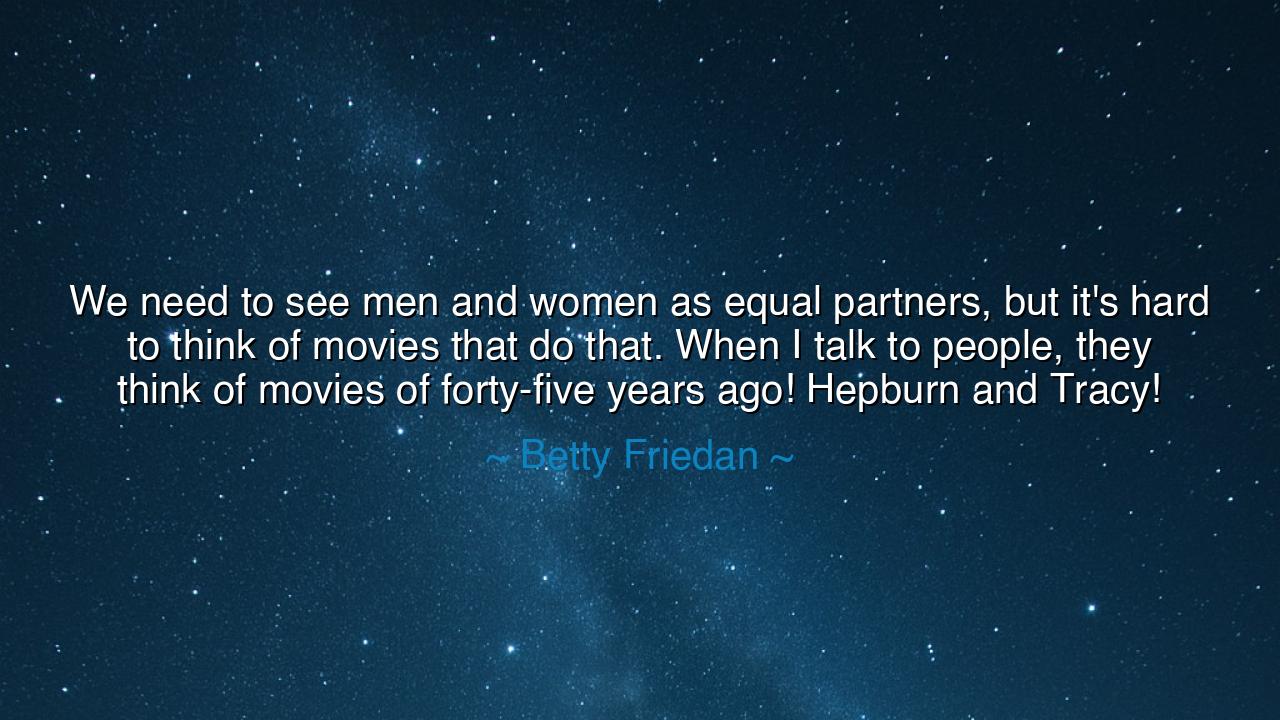
We need to see men and women as equal partners, but it's hard to
We need to see men and women as equal partners, but it's hard to think of movies that do that. When I talk to people, they think of movies of forty-five years ago! Hepburn and Tracy!






Hear, O children of truth and seekers of justice, the voice of Betty Friedan, who declared: “We need to see men and women as equal partners, but it’s hard to think of movies that do that. When I talk to people, they think of movies of forty-five years ago! Hepburn and Tracy!” In this reflection lies both yearning and lament: a yearning for a world where men and women walk side by side as equals, and a lament that even in art—where vision ought to be free—such balance is rarely found.
The meaning is thus: Friedan, warrior of the women’s movement, observed that cinema, the great mirror of society, too often reflects imbalance. In countless films, women are diminished, their stories subordinated, their roles tethered to the shadows of men. When she sought examples of equal partnership, listeners did not name works of her own age, but looked backward, to the legendary pairings of Katharine Hepburn and Spencer Tracy, whose films showed wit meeting wit, mind meeting mind, man and woman sparring yet respecting, laughing yet standing strong together. The fact that such examples seemed relics of the past was itself a rebuke to the present.
The ancients also grappled with this truth. Consider Odysseus and Penelope: though the epic centers on the hero’s return, the tale endures not only because of his cunning but because of her steadfastness, her clever weaving and unweaving, her equal strength in patience and wit. Together, though apart, they shaped the story. Yet even then, the voice of the woman was overshadowed, her brilliance hidden beneath the glow of the man’s adventure. Friedan’s cry is an echo of that imbalance: that the partnership of man and woman has too often been silenced by the dominance of one side.
History offers another mirror in the lives of Abigail and John Adams, who exchanged letters during the birth of America. John, a founding father, sought to shape a nation; Abigail, his wife, reminded him again and again to “remember the ladies,” warning that liberty denied to women would sow seeds of rebellion. Their exchange was not one of subservience, but of partnership—she advising, he listening, both engaging in the dialogue of freedom. This is the living example of what Friedan demanded: equal partners, neither diminished, neither erased.
At the heart of Friedan’s words is the recognition that representation shapes imagination. If audiences never see men and women as equals on screen, how shall they envision it in life? If films glorify only dominance, submission, or imbalance, how shall societies imagine balance? The stories we tell are seeds; they grow into the beliefs of generations. Thus, when Friedan called for movies of partnership, she was calling not only for better entertainment, but for a vision of society itself, one in which equality is natural and expected.
The lesson, then, is clear: seek and demand stories of true partnership. Do not be content with relics of the past, nor with shadows that mask inequality as romance. Support the art that shows balance, where men and women challenge each other, inspire each other, and walk as equals. Celebrate the stories that reflect the truth of shared humanity, and create new ones that future generations may look back upon not as rare exceptions, but as the common language of their age.
What, then, should you do? When you consume art, ask: does it honor equality, or does it diminish? When you tell stories—whether through film, word, or daily life—craft them with fairness, letting every voice ring with strength. And in your relationships, live the equality you wish to see in art, so that your life itself becomes a story of partnership. For it is not only the duty of cinema to change the vision of the world, but the duty of every soul.
Thus let Friedan’s words endure: “We need to see men and women as equal partners.” For this is not a plea for art alone, but a command for all humanity: that we walk side by side, neither above nor below, building a world where partnership is not rare but natural, not a relic of Hepburn and Tracy, but the living rhythm of every age.






AAdministratorAdministrator
Welcome, honored guests. Please leave a comment, we will respond soon